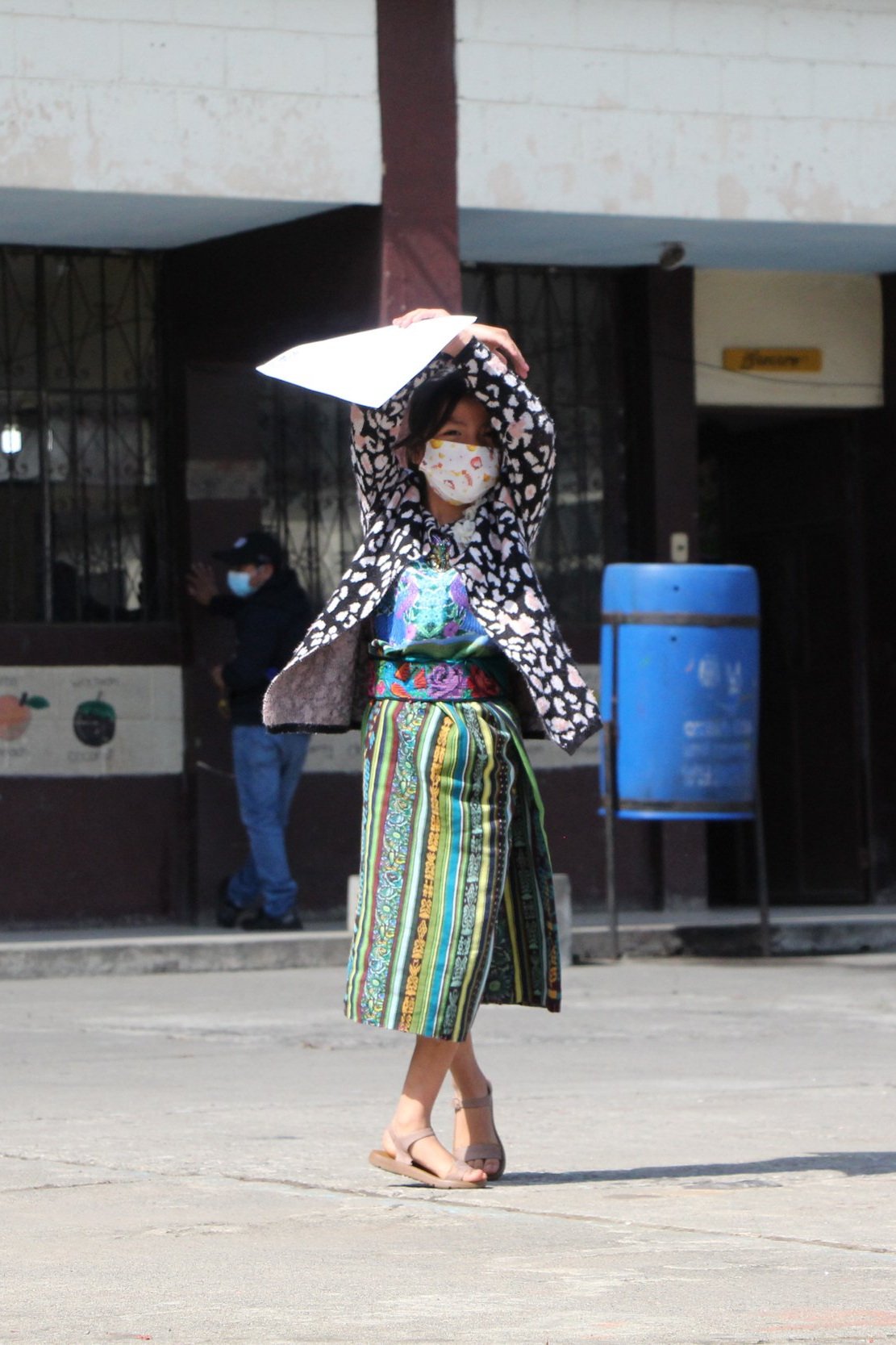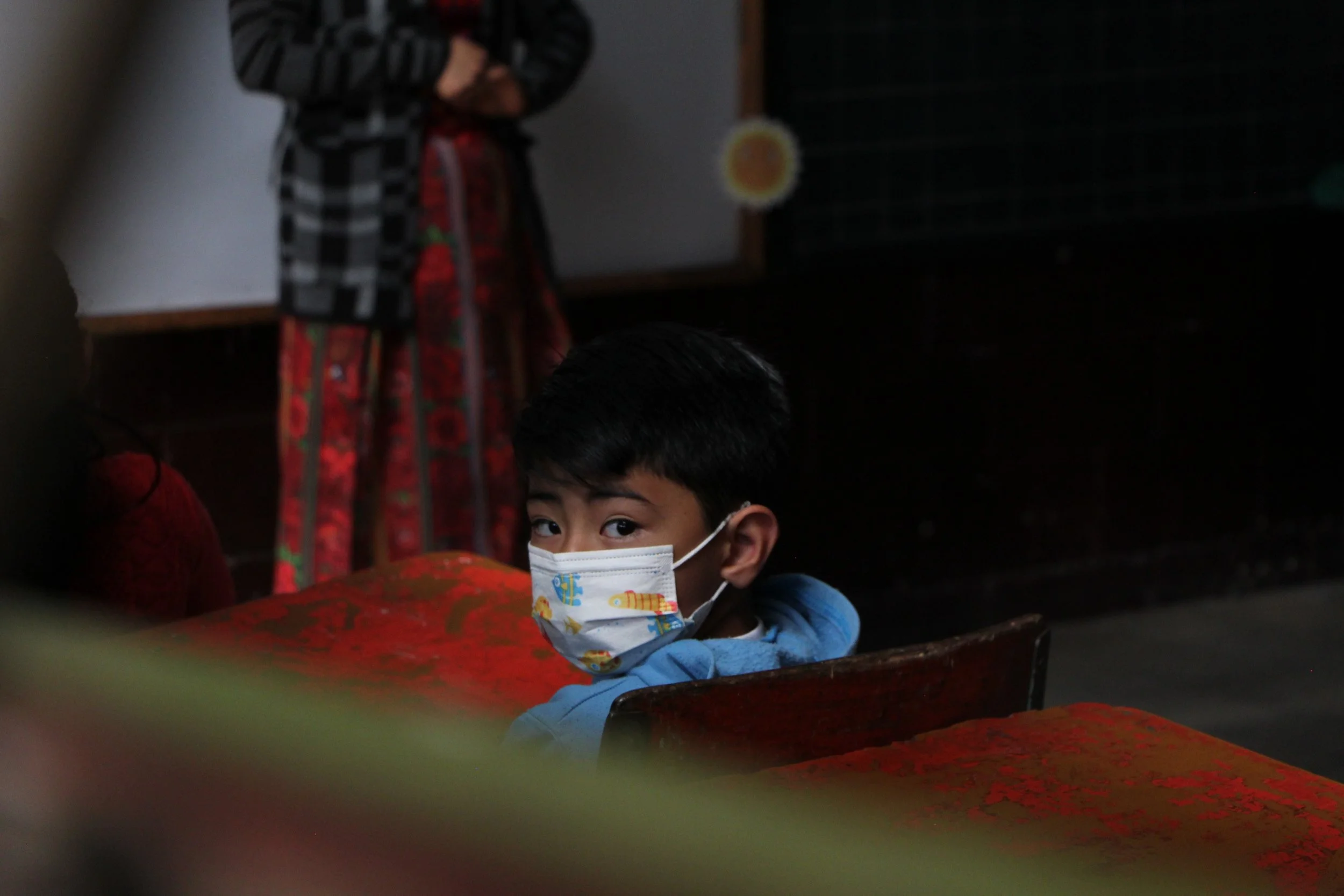Smiling behind the mask
For many reasons, rural Guatemalan children suffered more than most under the confines of COVID-19. Now, they’re trying to make up that time.
By Morgan Day
Jakelin Marleny smiles behind a pink and white polka dot mask while hopping up to straddle the cement of the dried-up fountain in the plaza of Santa María de Jesus.
“One, two, three, four, five, six, seven, eight, nine — I’m nine,” she says, counting out the numbers on her fingers as she recites the few English words she knows. Jakelin learns English, Spanish and Kaqchikel at her school, Colegio Angelitos de Dios, but she hasn’t been able to attend school in person for nearly two years.
Colegio Angelitos de Dios is a private primary school attached to Iglesia Santa María de Jesus. Seven years ago, a group of five Mayan women, with the support of the town’s priest, Father Hugo, founded the school with the goal of improving literacy in the pueblo, or town. The school serves as a low-cost, private alternative to the town’s public school, which is currently full and does not have room to accommodate all of the pueblo’s children.
Colegio Angelitos de Dios’ staff work to provide students with the skills necessary to succeed outside of the pueblo with higher education and better job opportunities. The adults of Santa María de Jesus often face discrimination from other towns because of their traditional Mayan clothing, lack of education and imperfect Spanish — the school’s mission is to combat this.
“The things we face, the things our parents faced … I don’t want that for our kids,” school administrator Elvia Oritz said. “We do this so they can have a better life — so they can do more than we could.”
Colegio Angelitos de Dios exists to provide the children in attendance an education in English, Spanish and Kaqchikel, giving students highly sought-after skills that will make them more suited to find jobs as they grow up.
But with the onset of the COVID-19 pandemic, teachers and parents have noticed the quality of education has decreased dramatically despite the efforts of the community.
“You can clearly see how the kids are not getting the same results in education,” first-grade teacher Cindy Acalón Ortiz said. “Some parents don’t know how to teach them, because they didn’t have an education themselves. We are seeing low performance from kids because of the pandemic.”
Marta Estrada has two children currently attending Colegio Angelitos de Dios. Her eldest, 10-year-old Jorge, wants to drop out.
“He feels that he isn’t learning. I feel that he isn’t learning either,” Estrada said. “He likes that he can make money working.”
Jorge is part of the 62% of Colegio Angelitos de Dios students without internet access. He receives his lessons weekly via WhatsApp text messages, sending photos of homework back and forth on his mother’s phone.
But not all families are able to receive these messages, and not all who do receive them are able to understand them.
María Hernández never learned to read and write. None of her six children living in her home are currently enrolled in school, either.
“I never went to school, but with [my kids] I am learning,” Hernández said. “I tell my husband that little by little, I will learn and with time I am going to be able to read all the messages.”
When classes went online and Colegio Angelitos de Dios closed their doors, Hernández’s children’s access to education shifted. Unable to afford internet access or a cell phone, the family doesn’t receive the weekly Google Meet or WhatsApp lessons. Not having received schooling herself, Hernández is not able to assist her children with their lessons, but she is determined to learn.
“All my kids are learning with me,” Hernández said. “‘You learn. I am also learning.’ That’s what I tell them.”
Donning medical masks and hand sanitizer, a teacher from Colegio Angelitos de Dios will meet with the family for an hour each week to correct their homework.
“People keep asking us ‘Why would you do this? You’re risking your safety,’” first-grade teacher Miguelito García said. “But I tell them, ‘It’s for the kids.’”
Hernández’s 13-year-old daughter Maribel walks up the dusty dirt road to Colegio Angelitos de Dios each week to pick up homework packets, meeting with teachers to review their work.
At least, she did until her father’s accident.
Three months ago, Hernández’s husband was hospitalized due to a work-related injury. Relying on his income to sustain them, the family could no longer afford the 15 quetzales ($2) monthly scholarship tuition rate at Colegio Angelitos de Dios.
The Hernández family did not return to school for the new year Jan. 17, and the public school in the pueblo does not have enough space for them.
García spends two six-hour days each week crafting homework packets for his students, meticulously placing black-and-white images of strawberries and oranges to teach numerals in English and Spanish. If his work is approved by administration and makes it into the hands of students, he knows that he needs to have clear, direct instructions anyone can understand. Not all of his 37 students will join the Google Meet lesson, nor does every parent have the skills to know how to help their child understand the material.
García longs for a return to normalcy.
“As teachers, we are really eager and hopeful for students to come back,” García said. “They’re not the same, being in person and learning online.”
García and the other teachers at Colegio Angelitos de Dios hope to obtain a permit to return to in-person classes by March 2022. The Ministry of Education has not yet approved this because of the low vaccination rate in the pueblo.
“All of the teachers are vaccinated, but not a lot of other people in the pueblo are,” Oritz said. “They aren’t educated and so they don’t understand [vaccinations], and so they don’t want it.”
Without improving vaccination rates, the obstacle preventing Colegio Angelitos de Dios from reopening remains in place. But the school found a loophole — a chance to reopen for one day for a meet-the-teacher event.
The groundskeeper unlocks the black iron gate at 7 a.m. Jan. 17 and sets a liter of gel antiseptic on a wooden stool near the entrance. Teachers slowly file in, sanitizing their hands, chatting about the events of their vacations. They open their classrooms and begin to prepare for students to arrive, scribbling schedules on whiteboards, printing homework packets and disinfecting desks. The small, splintering wooden chairs await the arrival of students for the first time in almost two years.
Meet-the-teacher marks the beginning of the school year. Jakelin, accompanied by her 17-year-old brother Kevin, walks through the black iron gate, sanitizes her hands and skips toward Tercero A to meet her new third-grade teacher. Jakelin and Kevin’s parents sell vegetables at La Terminal market in Guatemala City, an hour-and-a-half camioneta ride away, leaving Kevin to accompany Jakelin, as he is responsible for taking care of her during their parents’ working hours.
Receiving their lessons via WhatsApp text messages, the education of Jakelin and the other 190 students of Colegio Angelitos de Dios has changed since the onset of the COVID-19 pandemic. Students with internet access now attend two one-hour Google Meet calls a week: one to explain the homework assignments and one to review the answers. Those without access rely on text messages. Currently, the school’s enrollment is down by 38%.
Despite gathering in person for meet-the-teacher, this school year is not starting off any differently. No hugs. No playing with friends. No in-person learning.
Yet each teacher, student and parent walking into the school smiles behind their mask.
After meeting her teacher in person for the only time this school year and receiving her weekly homework packet, Jakelin sprints into the courtyard of the school. Leaping and twirling, waving her homework above her head, she smiles through her red and yellow cow-print medical mask.
Despite having class online again, not getting to see friends or learn in a classroom, Jakelin dances. She’s finally back at school. Jakelin spins, smiling behind the mask.
(Additional reporting by Nataly Basterrrechea.)




